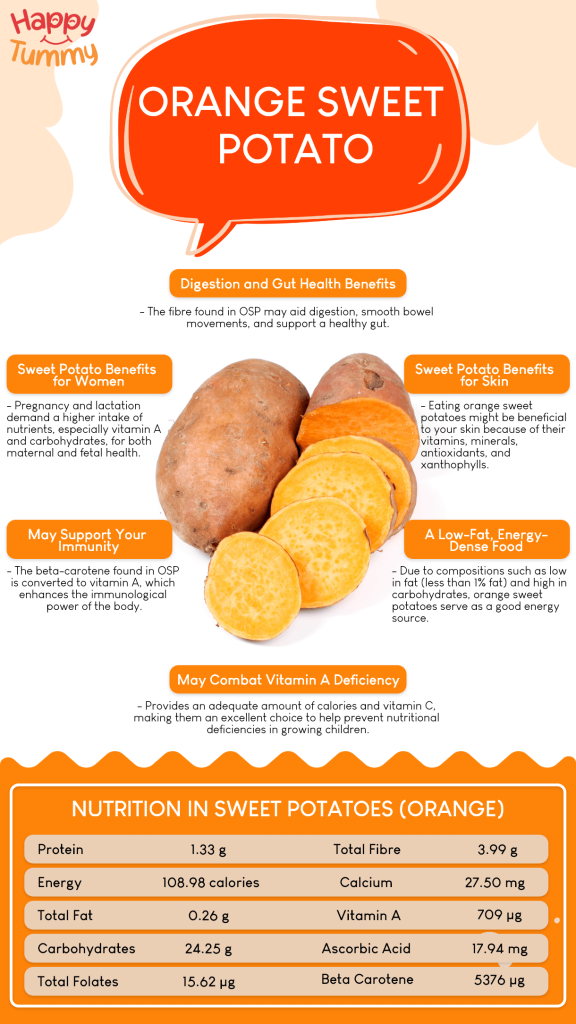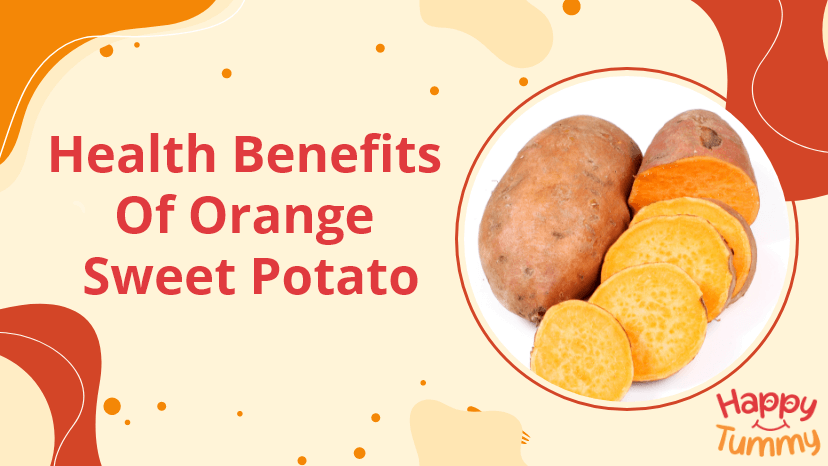Table of Contents
Orange sweet potato (OSP) or orange-fleshed sweet potato (OFSP) is also referred to as the ‘three in one’ tuber since it has all the nutritional qualities of cereals, fruits and vegetables.
It is high in starch, like cereals, packed with vitamins and pectins like fruits, and rich in vitamins and minerals like vegetables [1].
Being the second most important root tuber and the seventh most significant food crop worldwide, OFSP is gradually gaining acceptability in people’s daily meals [2].
Another important quality of orange sweet potato is that it is rich in beta-carotene and is one of the most affordable sources of antioxidants.
Additionally, orange sweet potato is a biofortified crop that may help combat malnutrition [3]. Now, let us look at the detailed nutrition and health benefits of orange sweet potato.
Nutrition in Sweet Potatoes (Orange)
Sweet potatoes, particularly the orange variety, offer a range of nutrients that might contribute to a balanced diet.
They are especially known for their vibrant colour from the inside, which indicates a high content of beta carotene, a precursor to vitamin A.
In addition to being a good source of carbohydrates and fibre, orange sweet potatoes provide essential vitamins and calcium that may support overall health.
This is why sweet potatoes are a vital source of nourishment in regions where dietary diversity is limited. Their naturally sweet flavour makes them appealing to a wide range of palates and diets.
The following table discusses the nutrition of the raw orange sweet potatoes for every 100 g [4]:
| Nutritional Component | Value (per 100 g) |
| Energy | 108.98 calories |
| Protein | 1.33 g |
| Total Fat | 0.26 g |
| Carbohydrate (g) | 24.25 g |
| Total Fibre (g) | 3.99 g |
| Vitamin A [5] | 709 µg |
| Total Folates (Vitamin B9) | 15.62 µg |
| Calcium | 27.50 mg |
| Ascorbic Acid (Vitamin C) | 17.94 mg |
| Beta Carotene | 5376 µg |
Benefits of Shakarkandi (Orange Sweet Potato)

1. Digestion and Gut Health Benefits [6]
- Orange sweet potato is not just a source of essential vitamins and minerals but equally plays a role in better digestive and gut health.
- The fibre found in OSP may aid digestion, smooth bowel movements, and support a healthy gut.
- In addition, a study suggests that sweet potatoes’ phytonutrients may also help mitigate oxidative stress and heavy metal toxicity within the digestive tract that may enter our bodies through food or the environment.
- This dual action, detoxification and improvement in gut health make orange sweet potato a functional food for anyone.
To make sure your digestive health is in the best shape, you can take the Aashirvaad Digestive Quotient test.
Here, you get your score out of 100, a clear indication of how healthy your stomach is and what changes you should make for a happy tummy.
2. May Combat Vitamin A Deficiency [7]
- Orange sweet potatoes have high amounts of beta-carotene, which is 5376 mcg for every 100g [8], an important precursor to vitamin A.
- It is required for various bodily functions, including vision, growth, immune health, and healthy skin [9].
- Children are most vulnerable to malnutrition. Around 50g of boiled orange-fleshed sweet potato is recommended for young children, aligning with the Indian Council of Medical Research (ICMR) guidelines that suggest a daily intake of 50g of roots and tubers [10]. This small serving may provide essential carotenoids necessary for the synthesis of vitamin A, which is crucial for maintaining proper eyesight.
- Along with that, OSP provides an adequate amount of calories and vitamin C, making them an excellent choice to help prevent nutritional deficiencies in growing children [11]. Thus, including sweet potatoes in a child’s diet supports overall health and development while ensuring they receive vital nutrients for their growth.
- For example, a study involving primary school children (5-10 years old) demonstrated that those who ate boiled orange sweet potatoes daily had better vitamin A levels [12]. This shows the potential of OSP to meet the challenge of combating vitamin A deficiency and enhancing the general health of targeted communities.
3. Sweet Potato Benefits for Women [13]
- Another advantage of sweet potatoes is that they may also benefit pregnant as well as postnatal women (new mothers).
- Pregnancy and lactation demand a higher intake of nutrients, especially vitamin A and carbohydrates, for both maternal and fetal health. Orange sweet potato, being rich in this essential nutrient, may support organs and skeletal growth, which is crucial for fetal development [14].
- Also, evidence proves that pregnant women who took OSP had better vitamin A status, lowering the probability of deficiency by 45%.
- Furthermore, OSP’s versatility makes it easy for mothers to incorporate it into their diets, whether through soups, mashed forms, or baked dishes. Not only does it have nutritional value to cater for the mother’s health, but it is also healthy for the baby’s growth.
As a good source of carbohydrates, orange sweet potatoes may provide adequate energy for physical and physiological functioning during pregnancy and lactation.
This not only supports the mother’s health but also contributes to the healthy growth and development of the baby.
4. May Support Your Immunity [15]
- It is well known that vitamin A helps to boost the immune system. Low vitamin A levels have been linked to weak immunity, making the body more vulnerable to infections.
- The beta-carotene found in OSP is converted to vitamin A [16], which enhances the immunological power of the body. It also helps maintain healthy skin and mucous membranes, which act as the first line of defense against harmful pathogens.
- For children whose immune systems are still developing, regular consumption of OSP may aid in managing gut inflammation and enhance immune responses [17].
- Moreover, vitamin A has proved to have therapeutic value in other infectious ailments. This means that OSP may act as a natural way to boost the immune system.
- Along with being rich in vitamin A, sweet potatoes are packed with antioxidants and possess anti-inflammatory properties that may aid in combating pathogens, harmful bacteria, and free radicals.
In addition to adopting dietary measures for boosting the immune system, Aashirvaad Multi Millets Mix Aata may help complete your meals.
This nutritious mix of five millet, Jowar, Bajra, Ragi, Navane, and Quinoa might be advantageous for acquiring the essential proteins, vitamins, and dietary fibre that assist with well-being.
5. Sweet Potato Benefits for Skin [18]
Eating orange sweet potatoes might be beneficial to your skin because of their vitamins, minerals, antioxidants, and xanthophylls, which are naturally occurring substances.
Recent studies suggest that these xanthophylls might safeguard the skin from damage and enhance overall antioxidant activity in the body.
Moreover, one should not forget the fact that diet affects skin health in general. Consider trying the Aashirvaad’ My Meal Plan’ test to ensure you get the right nutrients.
This tool gives a meal plan tailored to you that aligns with the recommended fibre intake, which the body requires to maintain a healthy gut.
And, of course, a healthy gut translates to the proper functioning of every aspect of health.
6. A Low-Fat, Energy-Dense Food [19]
- Due to compositions such as low in fat and high in carbohydrates [20], OSP serves as a good energy source.
- Its low-fat content, less than 1% fat, is particularly beneficial for those looking to manage overall fat intake while maintaining energy levels.
- For example, they are particularly beneficial for individuals engaged in sports or strenuous physical activities, such as weight lifting, swimming, and marathon running.
- The complex carbohydrates in sweet potatoes might provide a sustained source of energy, making them a good choice for active individuals looking to support their performance and recovery.
- Further, OSP contains 65.41% starch, which provides a consistent energy source and makes it suitable for athletes and people with high energy needs.
Together with oilseeds, orange sweet potatoes may go a long way in meeting energy needs.
Also, individuals on a weight management plan may find OFSP particularly helpful due to its high energy and low fat content.
Conclusion
Orange sweet potatoes, therefore, appear to be one of the most nutritious foods that have the potential to combat undernutrition or general malnutrition.
Their high beta-carotene content makes them an excellent source of antioxidants, which may protect us from cardiovascular conditions, diabetes, inflammation, change to micronutrient deficiencies, and gastrointestinal digestive issues [21] [22].
But, in order to have good health, one must also have a balanced diet.
The best idea is to have OSPs alongside other healthy foods, which provide all the necessary nutrients, and if you have special needs, consult a nutritionist.
FAQs
Orange sweet potatoes might be especially useful because they are among the foods highest in beta-carotene, which the body converts into vitamin A [23]. This nutrient may enhance immunity, vision, and general health, particularly in children [24], breastfeeding, and pregnant women [25].
The major distinction is in terms of colour and nutritional quality. Orange sweet potatoes contain very high levels of beta-carotene, which endows them with an orange hue and makes them a rich source of vitamin A [26]. Compared to other varieties, OSP may be considered for its effectiveness in fighting vitamin A deficiency and other health issues, such as malnutrition, that are a societal concern around the world [27].
Yes, diabetics may eat orange sweet potatoes, especially when boiled, as they might have a lower glycemic index (GI) compared to baked or roasted varieties [28]. Sweet potatoes have a lower glycemic index (GI) of 41 compared to other roots and tubers, which might make them a suitable option for individuals with diabetes. This lower GI means that they have a lesser impact on blood sugar levels compared to many other roots and tubers, making them a safer choice for diabetic individuals. Their good fibre levels may also help regulate blood sugar levels [29] [30].















